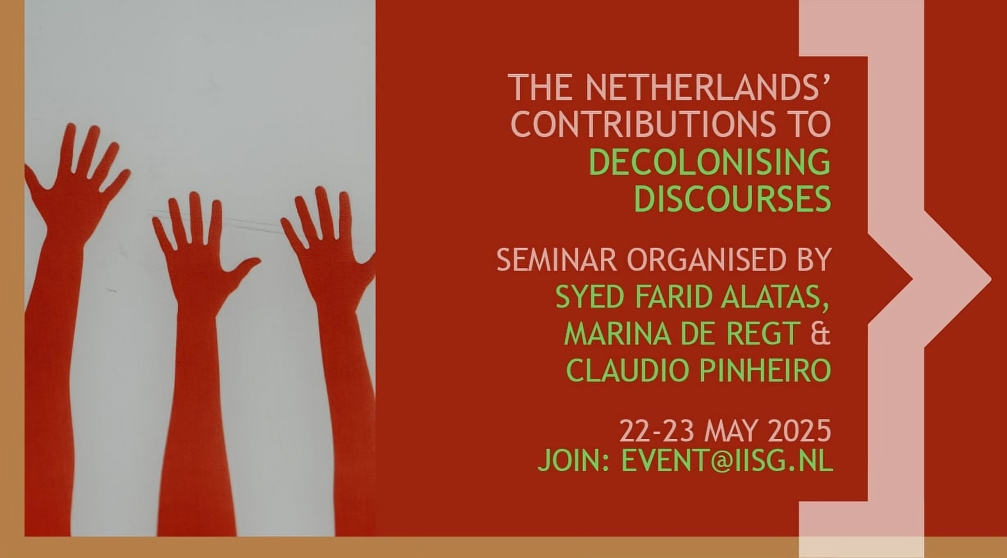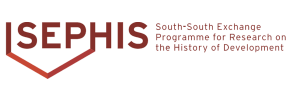Events
The Netherlands' Contributions to Decolonial Discourses, Development Cooperation and Democracy
International Institute of Social History, Amsterdam, May 22-23 2025

The objective of this seminar is to discuss the unique contribution of Dutch scholars and policymakers to decolonising discourses in the social sciences and humanities.
The focus will be on the legacy and influence of the so-called Amsterdam School, a school of historical sociological analysis of modern Asian history and political economic development that was led by the late Professor Wim Wertheim from the late 1940s. The students who were trained or mentored by Wertheim included both Dutch and foreigners who studied at the University of Amsterdam from the 1940s on.
Critical perspectives in the social sciences and humanities that have exposed Eurocentric orientations in knowledge production have emerged throughout the Third World/Global South. Different countries/regions have produced their own distinctive approaches. Examples are those of the indigenization of psychology and anthropology, subaltern studies, post-colonial theory, Asia as method, autonomous knowledge, and decolonial thought. While there has been a proliferation of research from many parts of the world, there has been virtually no recognition of the contributions of scholarship from the Netherlands to such discourses. The proposed seminar, therefore, will focus on the impact of the Amsterdam School on the development of a number of perspectives/programmes that by now have become part of the anti-colonial/decolonising discourses in/on the Third World/Global South.
Specifically, these are: (1) the Autonomous Knowledge tradition started by Syed Hussein Alatas who was mentored by Wertheim at the University of Amsterdam from the late 1940s till the early 1960s; (2) the Bogor School inspired by Sajogyo, who was mentored by Wertheim at the University of Indonesia at Bogor (now the Bogor Institute of Agriculture) when Wertheim was based in Indonesia; and (3) the South-South Exchange Programme for Research on the History of Development (SEPHIS), a programme that was established in 1994 with the objective of generating alternative visions of development other than those formulated by Western development agencies and scholars.
We will host a final roundtable explores how this Netherlands’ legacy helps challenge the contemporary political scenario encouraging new liberatory discourses that promote Development Cooperation and Democracy. We invite both scholars, policy makers, practitioners and students to share thoughts and initiatives to inspire a fresh agenda and actions.
Thursday May 22
09.30 – 10.00 | Coffee/Tea
10h | Welcoming remarks
Marina de Regt, Vrije Universiteit Amsterdam & Sephis
Claudio Pinheiro, Rio de Janeiro Federal University & Sephis
Session 1 | Individuals Initiatives, Generation and Collective Challenges
Chair: Marina de Regt
10h.20 | Talk 1 | Lessons from My Father, Wim F. Wertheim
Anne-Ruth Wertheim, Independent Researcher
11h | Talk 2 | Syed Hussein Alatas and Amsterdam: The Roots of Autonomous Knowledge
Syed Farid Alatas, National University of Singapore; Asia West East Centre
11h40 | Talk 3 | International Aid, Food, and Foreign Autocrats: Foreign aid for Food Crisis during Indonesia’s Early Independence
Grace Leksana, Utrecht University
12h.20 | Talk 4 | Weaving Dutch-Indonesian Resistance against Post-colonial Violences
Dr. Rika Theo, Processing Archivist, International Institute for Social History (IISH)
Amsterdam | Information Specialist, University of Amsterdam
13h – 14h.30 | Lunch
Session 2 | Development Cooperation and Peripheral Conversations: Agrarian Studies, Rural Realities and Foreign Aid
Chair: Farid Alatas
14h30 | Talk 5 | Amsterdam, Wageningen, Yale and the Emergence of Critical Agrarian Studies in Indonesia
Ben White, International Institute of Social Studies
15h10 | Talk 6 | Rural Realities, Scientific Responsibility: Sajogyo’s Legacy of Reflexive Social Science
Faris Rahmadian, Wageningen University
15h50 | Talk 7 | The Ongoing Drain Squeezed out of Indonesia at the Onset of Decolonization
Jan Breman, Universiteit of Amsterdam
16h30 | Drinks
May 23 (Friday)
9.30 – 10h | Coffee & Tea
Session 3 | South-North-South Development Cooperation: Institutionalizing critical approaches and attitudes
Chair: Willem van Schendel
10h | Talk 8 | Conceptualizing development and an Amsterdam School in the Netherlands
Otto van den Muijzenberg, University of Amsterdam
10h40 | Talk 9 | From Development Work to a Southern Attitude: Personal Reflections
Marina de Regt, Vrije Universiteit Amsterdam; Sephis
11h20 | Talk 10 | Thirty years of Sephis Programme: Cultivating Critical Thinking and Attitudes for Academic and Social Development
Claudio Pinheiro, Rio de Janeiro Federal University, Brazil; Sephis
12h | Lunch
Session 4 | Policy Dialogue Discussion
Chair: Claudio Pinheiro
13h30 | Dutch Legacies and the New Challenges of Development Cooperation for the Political Stability of Democracies at large
This roundtable explores how this Netherlands’ legacy can instrumentalize the challenges of the contemporary political scenario, encouraging new liberatory discourses and political attitudes that promote Development Cooperation and Democracy. We invite both scholars, policy makers, practitioners and students to share thoughts and initiatives to inspire a fresh agenda and actions.
15h30 | Closing Remarks | Syed Farid Alatas
Practical
Place Posthumus-zaal, IISG, Cruquiusweg 31, Amsterdam
Entrance Free entrance, but please register at event@iisg.nl
The seminar is co-organised by the Vrije Universiteit Amsterdam, Wageningen University, the South-South Exchange Programme for Research on the History of Development (SEPHIS), and the Asia West East Centre, Malaysia.
Organizers
Syed Farid Alatas, Asia West East Centre (AsiaWE), Kuala Lumpur
Marina de Regt, Sephis/Vrije Universiteit Amsterdam
Claudio Pinheiro, Sephis/Federal University of Rio de Janeiro
